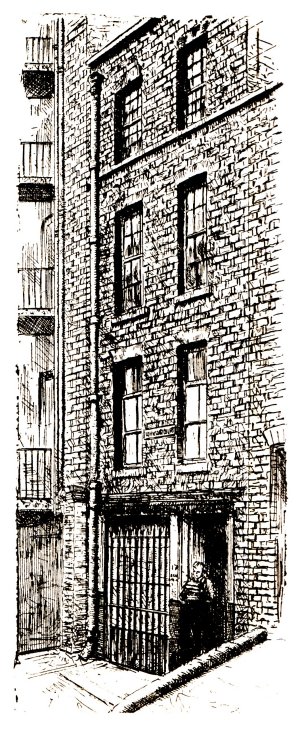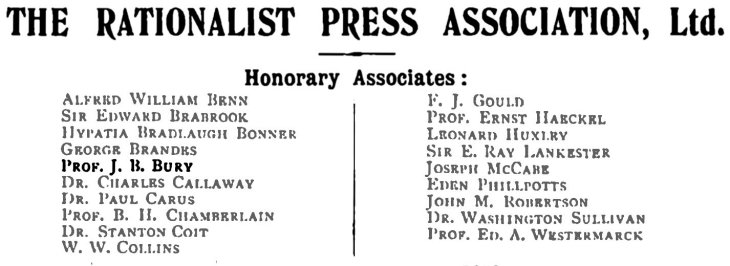R.P.A. – Rationalist Press Association
—
THE RATIONALIST PRESS ASSOCIATION – R.P.A.
—
—
The Rationalist Press Association – R.P.A. is an organisation founded, at the end of the 19th century, out of Britain’s humanist, secularist, rationalist, and freethought movements, following the radical activism of Thomas Paine (1737-1809), William Godwin (1756-1836), Mary Wollstonecraft (1759-1797), Richard Carlile (1790-1843), Charles Bradlaugh (1833-1891), Charles Watts (1836-1906), George Jacob Holyoake (1817-1906), and others.
—
 |
—
— It has been organised by a first group of militants – George Jacob Holyoake (1817-1906), Frederick James Gould (1855-1938), Joseph McCabe (1867-1955), Hypatia Bradlaugh Bonner (1858-1935), &c. – gathered around the publisher Charles Albert Watts (1858-1946) and his printworks (CA Watts & Company Limited at Johnson’s Court, just off Fleet street, London). — — first siege of RPA, at Johnson’s Court, 17. |

— expanded headquarters of RPA, at Johnson’s Court
|
 |
—
![]()
—

— |
—
|
—
ARTICLES OF J.B. BURY IN

—
| John B. BURY – THE SUCCESS OF CHRISTIANITY – in The R.P.A. Annual and Ethical Review, 1915, pp.3-7 |
| John B. BURY – CLEOPATRA NOSE – in The R.P.A. Annual and Ethical Review, 1916, pp.16-23 |
| John B. BURY – THE INFLUENCE OF CHRISTIANITY ON ROMAN CRIMINAL LAW – in The R.P.A. Annual and Ethical Review, 1918, pp.19-24 |
| John B. BURY – FREEDOM OF SPEECH AND CENSORSHIP – in The R.P.A. Annual and Ethical Review, 1919, pp.16-19 |
| John B. BURY – PLAYING FOR SAFETY – in The R.P.A. Annual, 1920, pp.13-19 |
| John B. BURY – THEISM – in: The R.P.A. Annual, 1921, pp.16-18 |
| John B. BURY – BAYLE ON ORIGINAL SIN – in The R.P.A. Annual, 1923, pp.29-32 |
| John B. BURY – THE TRIAL OF SOCRATES – in The R.P.A. Annual, 1926, pp.17-26 |
—
—
ARTICLES OF J.B. BURY IN
—

—
| John B. BURY – Mr. BELLOC ON ANTI-CATHOLIC HISTORY – in The Literary Guide, 1915, January, p.8; February, pp.25-26; March, pp.41-43. ⊕ |
—

—
Certain features of our “progress” may be urged as presumptions in its favour [a movement in a desirable direction], but there are always offsets, and it has always been easy to make out a case that, from the point of view of increasing happiness, the tendencies of our progressive civilisation are far from desirable. In short, it cannot be proved that the unknown destination towards which man is advancing is desirable. The movement may be Progress, or it may be in an undesirable direction and therefore not Progress.
—
John B. Bury (1861-1927)


